Russian troops have begun to retreat from Ukraine’s Kherson region, just the latest humiliating pullout to leave pro-Kremlin military bloggers and propagandists fuming.
Russian Defense Minister Sergei Shoigu handed down the order on Wednesday afternoon to pull out to the other side of the Dnipro River. The move came after Russian troops reportedly began blowing up bridges as they pulled out, with Russian flags being removed from buildings in the center of Kherson—the only regional capital captured by Russian forces in the full-scale invasion.
“For us, life and health of the military personnel is always the priority,” Shoigu said in announcing the decision.
Bizarrely, the order came after Sergei Surovikin, Russia's top commander in Ukraine, boasted of Russian troops supposedly suffering seven times fewer losses than the Ukrainian military in Kherson.
It also came just six weeks after Vladimir Putin taunted Kyiv with the declaration that residents of Kherson and other occupied Ukrainian regions “are becoming our citizens forever.”
Pro-Kremlin bloggers had been expecting the pullout—and raging against the decision as yet another “abandonment” by the Russian military.
But in the midst of the humiliating retreat, Kremlin-controlled proxy authorities on Wednesday announced the sudden death of one of the most high-profile leaders in the occupied Kherson region.
Kirill Stremousov, the deputy head of the region, was said to have been killed in a car accident. Vladimir Saldo, the Russian-installed governor of the region, took to Telegram to announce the news after it was first reported in Russian media.
Russia’s RIA Novosti cited an unnamed source who said Stremousov’s SUV was struck by a truck at an intersection. The driver of the truck was said to have made a “dangerous maneuver” that caused the wreck.
As soon as his death was announced, many pro-Kremlin military bloggers who’d been busy venting about Russia’s “shocking” retreat from the region suddenly shifted to writing condolences for Stremousov.
Few details were initially given on the crash, and Russian-backed health officials in the region where it is said to have occurred refused to confirm that he’d died, saying only that they could confirm there was a traffic accident. Though Saldo said Stremousov had been killed in the Kherson region, some independent Russian media outlets noted that he’d confirmed in late August he had evacuated to Russia.
The murky nature of his reported death—and the speed with which a slew of pro-Kremlin social media channels simultaneously posted condolences—led some Ukrainian authorities to suggest the tragedy had been a deliberate hoax. Yuri Sobolevksy, the first deputy chair of the Kherson regional council, suggested Stremousov’s death may have been “staged” in a statement on Facebook, though he did not elaborate.
It was not clear why he believed it may have been staged, but reports of Stremousov’s death came amid mounting outrage among Russian hardliners about the retreat from Kherson.
And as soon as his death was announced, they briefly shifted from publicly venting frustrations about military failures to penning tributes to Stremousov.
Shoigu’s announcement, however, reignited the wrath of the Russian hardliners fed up with a string of recent retreats.
“The main thing is not victory, but participation,” one popular Russian military channel quipped on Telegram.
“The surrender of Kherson is the biggest geopolitical defeat of Russia since the fall of the U.S.S.R.,” wrote pro-Kremlin political analyst Sergei Markov. “The political consequences of this huge defeat will be really big. The main reason for the defeat is the refusal [to carry out] a real war and the catastrophic delay in making necessary decisions.”
Ukrainian authorities, meanwhile, expressed skepticism about the ordered pullout, with Nataliya Gumenyuk, the spokeswoman for the southern command of the Ukrainian army, calling the announcement a bid to “save face” that might be part of “an information-psychological operation” meant to “create a false impression of the true intentions.”
Andriy Yermak, the Ukrainian president’s chief of staff, seemed to share that sentiment, writing on Telegram: “Some people think they are very cunning, but we’re a step ahead.”







